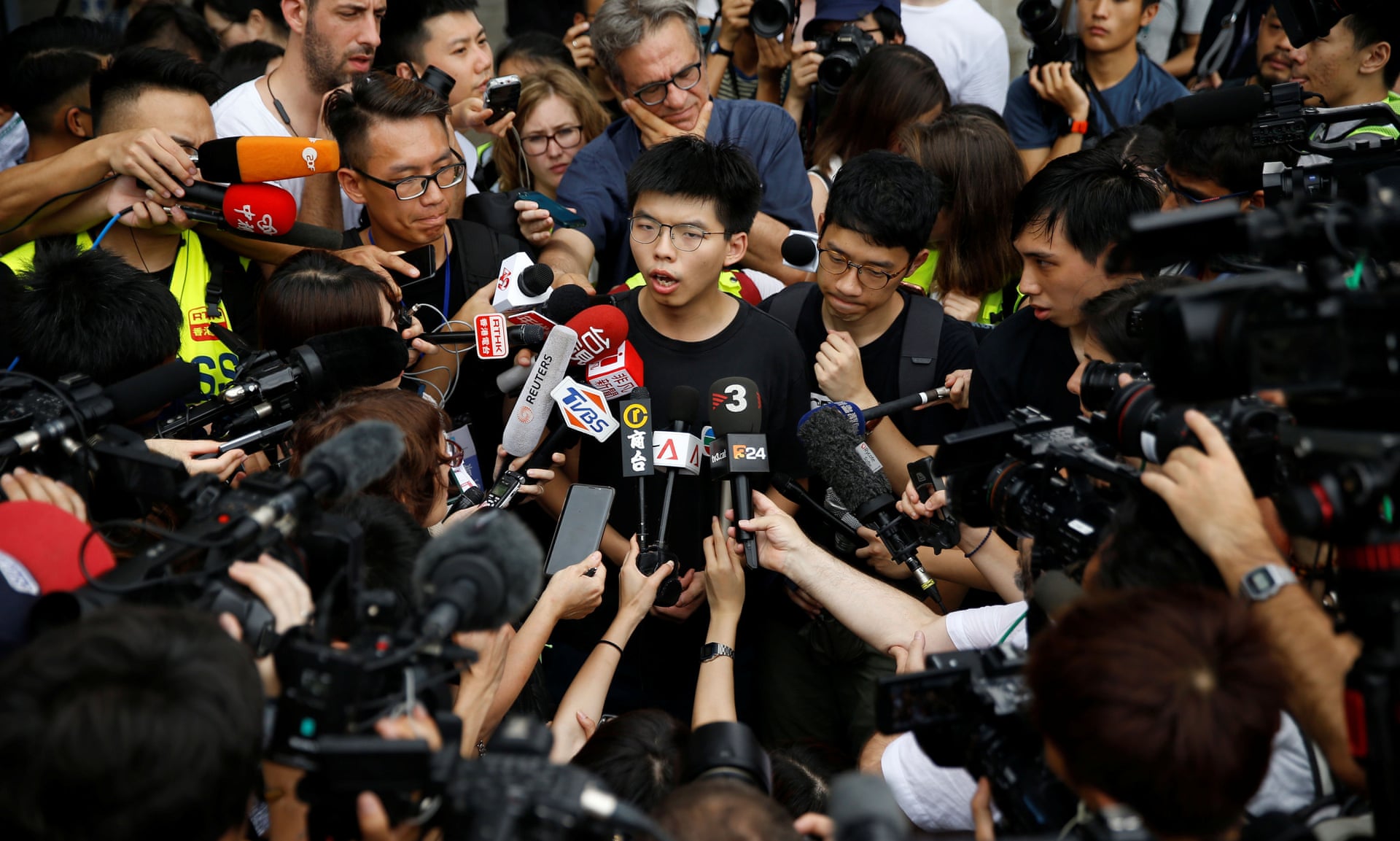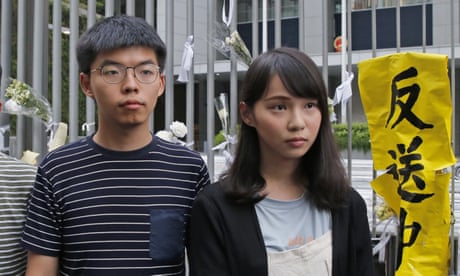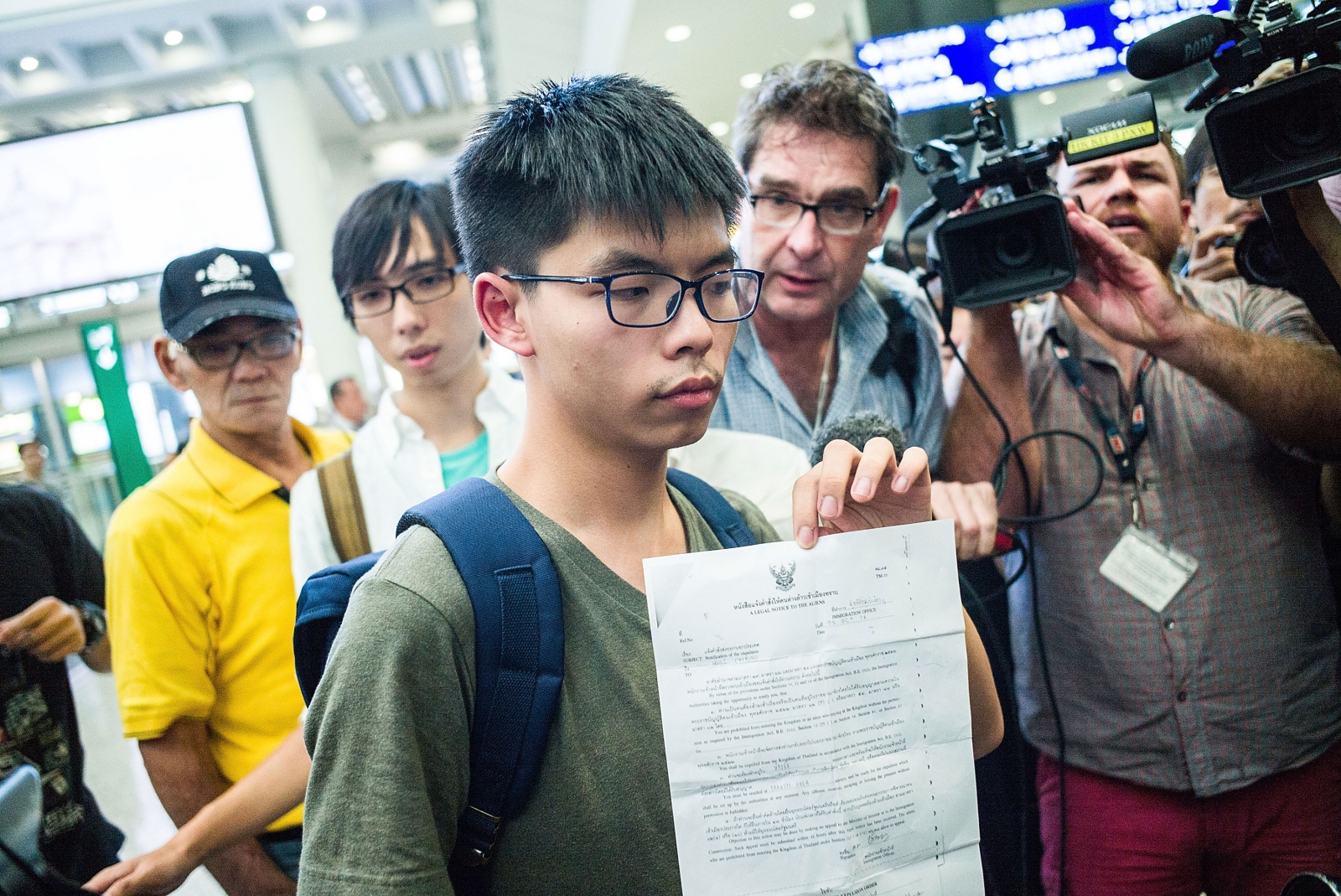Pro-democracy figure said protesters must keep up the fight or outcome will be ‘unimaginable’
Tania Branigan in Hong Kong
Joshua Wong has been arrested in Hong Kong.
Joshua Wong was serving a prison sentence for his role in the 2014 “umbrella movement” when Hong Kong’s current protests broke out.
He said: “Agnes Chow visited me and said: ‘You know, on 17 June, when you are released, I guess the extradition bill will already have passed. In fact, 2 million people went on the street.”
The unprecedented outpouring of public anger had already forced Carrie Lam, the city’s chief executive, to announce that the bill was dead – and has kept the protests going.
But as the movement enters its 13th weekend, Wong and Chow are among hundreds who have been arrested over the unrest.
In an interview conducted before his arrest, the secretary general of pro-democracy group Demosistō said no one could have imagined such large-scale and enduring turmoil.

Joshua Wong and Agnes Chow
He said: “They cannot govern Hong Kong any more. Five years ago, we said youngsters were standing on the frontlines and parents were criticising them. But baby boomers have been very supportive this time. People might not agree with all the behaviour of the protesters, but everyone is asking what’s the reason for teargas in residential areas, in roads where there aren’t even protesters?”
He pointed to a poll showing that about four-fifths of the population want an independent inquiry into the police response to unrest – a key demand of the movement – and that almost as many want the government to completely withdraw the bill.
He said: “Never in Hong Kong history have you had people supporting a political demand like that.”
Wong said that while low wages and cramped housing had played a part in fomenting discontent, they were not driving the protests, with many professionals and wealthier people taking part, too.
In an interview conducted before his arrest, the secretary general of pro-democracy group Demosistō said no one could have imagined such large-scale and enduring turmoil.

Joshua Wong and Agnes Chow
He said: “They cannot govern Hong Kong any more. Five years ago, we said youngsters were standing on the frontlines and parents were criticising them. But baby boomers have been very supportive this time. People might not agree with all the behaviour of the protesters, but everyone is asking what’s the reason for teargas in residential areas, in roads where there aren’t even protesters?”
He pointed to a poll showing that about four-fifths of the population want an independent inquiry into the police response to unrest – a key demand of the movement – and that almost as many want the government to completely withdraw the bill.
He said: “Never in Hong Kong history have you had people supporting a political demand like that.”
Wong said that while low wages and cramped housing had played a part in fomenting discontent, they were not driving the protests, with many professionals and wealthier people taking part, too.
He said: “Everyone knows Hong Kong people are just asking for fundamental rights enjoyed by western countries since the last century.”
Wong was a student leader who became the face of the 2014 movement and co-founded Demosistō. This time the protests are leaderless and he is just one face among many.
Wong was a student leader who became the face of the 2014 movement and co-founded Demosistō. This time the protests are leaderless and he is just one face among many.
Participants make their own decisions on the streets or via online voting.
But arresting him and Chow, another leading figure in Demosistō, is a gamble.
But arresting him and Chow, another leading figure in Demosistō, is a gamble.
Protesters may well be intimidated by the cumulative effect of arrests, sackings and attacks by thugs. But all the previous attempts to turn up the pressure have created further anger, and sustained mass participation.
Wong said: “Mistakes by the riot police and Hong Kong government encourage people to continue this movement.”
Protesters are under no illusions about the likelihood of retaliation once the movement is over, given what happened after 2014.
Wong said: “One country, two systems [China’s formula for ruling Hong Kong after Britain returned the city to Beijing in 1997] was eroded systematically after the umbrella movement: there were jailings, the disqualification of legislative council members, the booksellers were kidnapped, a foreign correspondent’s visa was not renewed … If we don’t continue, the crackdown will be far worse than you can imagine.”
Many believe authorities will crack down far more harshly if there is no sign of the movement dwindling.
Protesters are under no illusions about the likelihood of retaliation once the movement is over, given what happened after 2014.
Wong said: “One country, two systems [China’s formula for ruling Hong Kong after Britain returned the city to Beijing in 1997] was eroded systematically after the umbrella movement: there were jailings, the disqualification of legislative council members, the booksellers were kidnapped, a foreign correspondent’s visa was not renewed … If we don’t continue, the crackdown will be far worse than you can imagine.”
Many believe authorities will crack down far more harshly if there is no sign of the movement dwindling.
Mainland media have shown paramilitary police drills near the border with Hong Kong and there is growing talk that the government might invoke the emergency regulations ordinance, a colonial-era giving sweeping powers to the chief executive on everything from censorship to arrest and property seizures.
Wong said: “I can’t imagine what would be the outcome. Of course they’re trying to scare people. But I think it also scares the world.
“World leaders may not care about the extradition bill or whether Hong Kong people have the right to vote. But the idea of troops in the CBD [central business district] – that’s what they worry about.
“It would have an impact on the global economy. Just imagine the internet being shut down – how could financial markets operate smoothly? Even the [pro-establishment] tycoons will urge Carrie Lam not to use this ordinance. Political freedom for Hong Kong depends on Beijing. But the economy depends on western countries.”
He said he believed that international opinion was shifting, citing the recent joint statement from the G7 on Hong Kong, remarks from the UK’s foreign affairs select committee and growing political support among US politicians.
Wong said: “People ask, how can we succeed? Someone told me the state would win. They’ve won for the last 22 years [since the handover] already, and especially in the last five years. We have nothing to lose.”
Wong said: “I can’t imagine what would be the outcome. Of course they’re trying to scare people. But I think it also scares the world.
“World leaders may not care about the extradition bill or whether Hong Kong people have the right to vote. But the idea of troops in the CBD [central business district] – that’s what they worry about.
“It would have an impact on the global economy. Just imagine the internet being shut down – how could financial markets operate smoothly? Even the [pro-establishment] tycoons will urge Carrie Lam not to use this ordinance. Political freedom for Hong Kong depends on Beijing. But the economy depends on western countries.”
He said he believed that international opinion was shifting, citing the recent joint statement from the G7 on Hong Kong, remarks from the UK’s foreign affairs select committee and growing political support among US politicians.
Wong said: “People ask, how can we succeed? Someone told me the state would win. They’ve won for the last 22 years [since the handover] already, and especially in the last five years. We have nothing to lose.”








